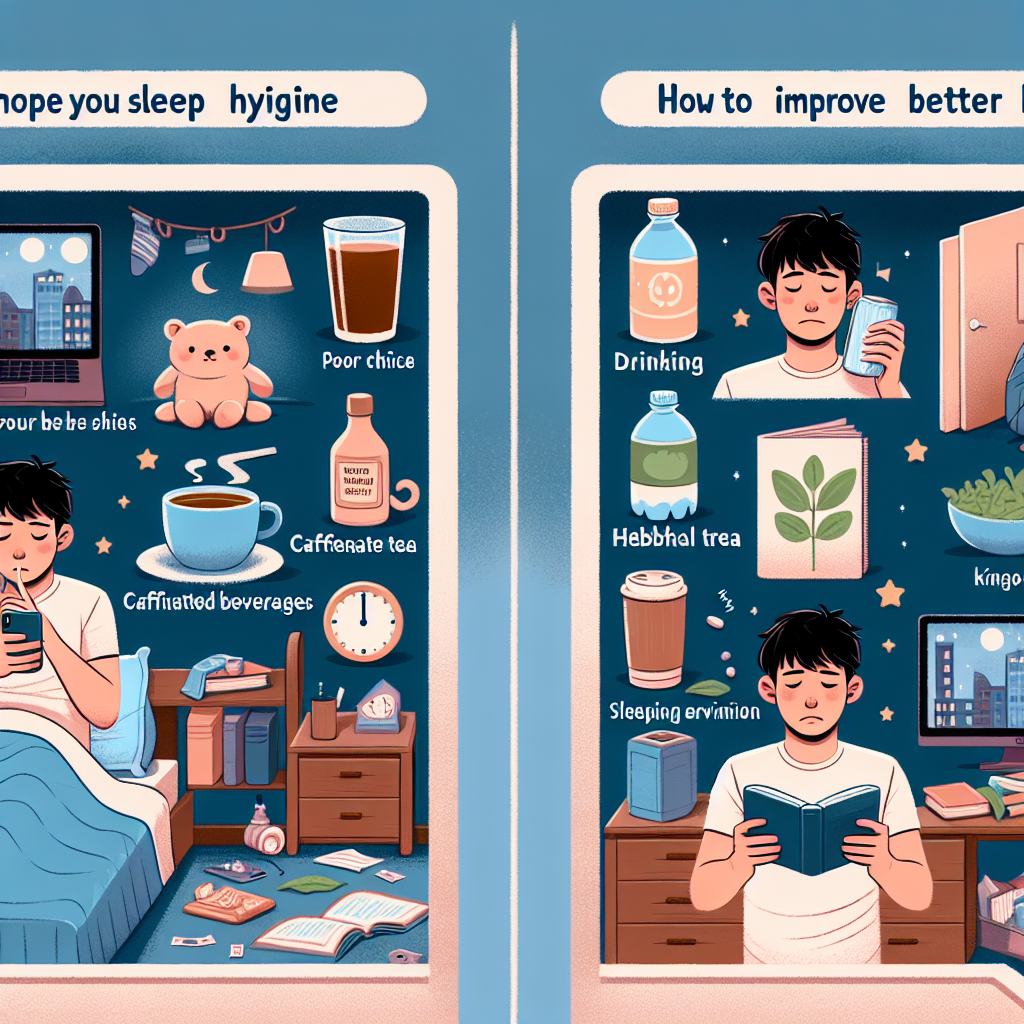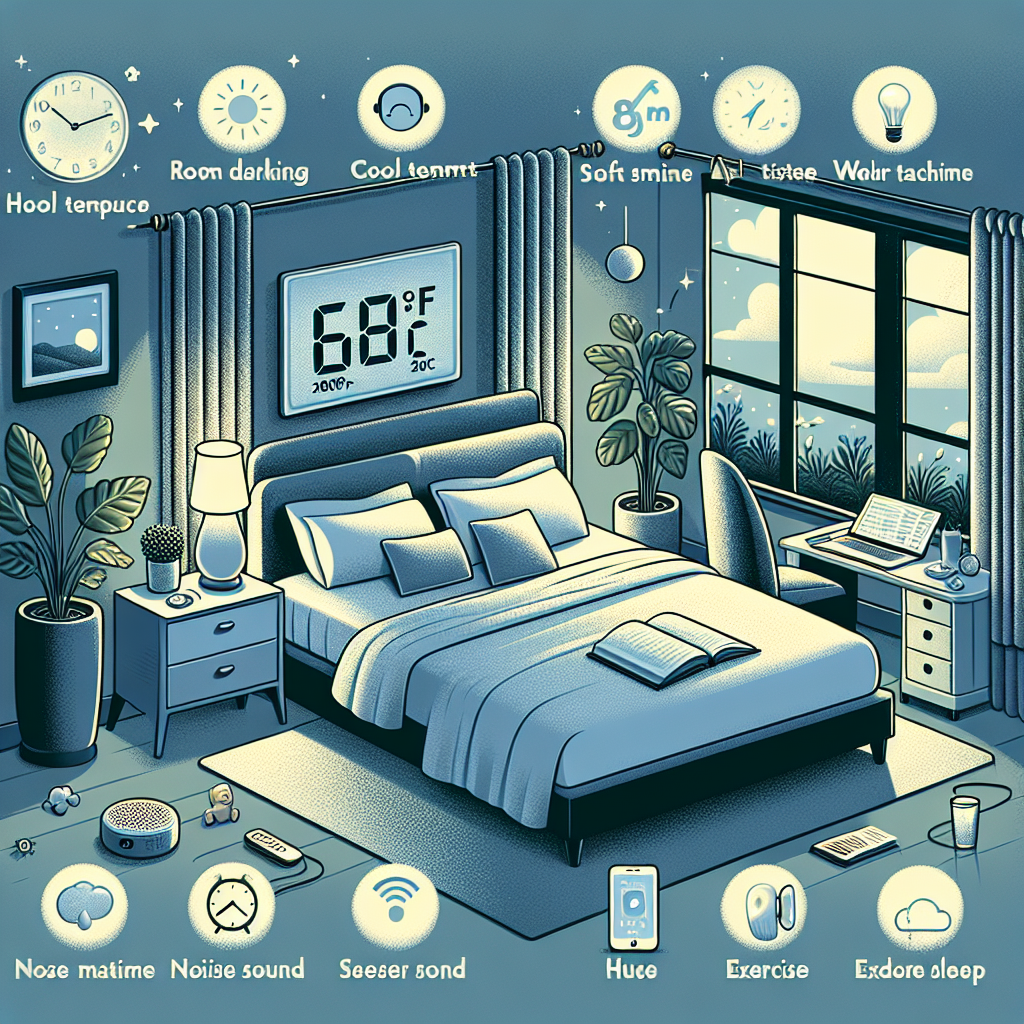How to Improve Sleep Hygiene for Better Rest

Start improving your sleep hygiene for better rest today! Discover effective strategies and tips on our website. Click here to begin your journey towards vibrant vitality and restful nights.
Effective Techniques to Enhance Sleep Hygiene for Optimal Rest
Sleep hygiene, a term that refers to the habits and practices conducive to sleeping well on a regular basis, is a crucial aspect of maintaining overall health and well-being. A lack of quality sleep can lead to a myriad of health issues, including heart disease, diabetes, and depression. Therefore, it is essential to understand and implement effective techniques to enhance sleep hygiene for optimal rest.
Firstly, establishing a consistent sleep schedule is paramount. This means going to bed and waking up at the same time every day, even on weekends or days off. Our bodies have an internal clock, known as the circadian rhythm, which regulates feelings of sleepiness and wakefulness. By sticking to a regular sleep schedule, we can support our body’s natural rhythm and promote better sleep.
Secondly, creating a restful environment is key. This involves making your bedroom a sleep-friendly zone. The room should be dark, quiet, and cool. Consider using earplugs, an eye mask, or a white noise machine if necessary. Moreover, investing in a comfortable mattress and pillows can significantly improve the quality of your sleep.
In addition, it is important to pay attention to what you eat and drink before bedtime. Avoid consuming large meals, caffeine, and alcohol close to bedtime. These can disrupt your sleep cycle and prevent you from falling asleep or staying asleep. Instead, opt for light, healthy snacks if you’re hungry, and try to limit fluid intake to prevent middle-of-the-night bathroom trips.
Furthermore, incorporating physical activity into your daily routine can help you sleep better. Regular exercise, particularly in the morning or afternoon, can significantly improve sleep quality. However, try to avoid vigorous workouts close to bedtime as they might interfere with your ability to fall asleep.
Another effective technique is to manage worries. Stress and anxiety can interfere with sleep more than most people realize. Therefore, it’s important to find ways to manage these feelings. This could involve techniques such as meditation, deep breathing, progressive muscle relaxation, or talking to a mental health professional.
Lastly, it’s crucial to be mindful of your exposure to light. Exposure to natural light during the day and darkness at night helps to regulate your body’s natural sleep-wake cycle. Therefore, try to get plenty of natural light during the day, and limit exposure to artificial light in the evening, especially close to bedtime.
In conclusion, improving sleep hygiene is not a one-size-fits-all approach. It involves a combination of various techniques tailored to individual needs and preferences. By establishing a regular sleep schedule, creating a restful environment, paying attention to diet, incorporating physical activity, managing worries, and being mindful of light exposure, you can significantly enhance your sleep hygiene and enjoy better rest. Remember, good sleep is not a luxury, but a vital sign of good health. Therefore, it’s worth investing time and effort into improving your sleep hygiene for optimal rest and overall well-being.
Exploring the Connection Between Sleep Hygiene and Quality Rest

Sleep hygiene, a term that has gained significant traction in recent years, refers to the habits and practices that are conducive to sleeping well on a regular basis. It is a concept that is intrinsically linked to the quality of rest we receive, and thus, understanding and improving our sleep hygiene can lead to better rest and overall health.
To begin with, it is important to understand that sleep is not merely a passive activity, but a dynamic process that affects our physical and mental health in profound ways. It is during sleep that our bodies repair tissues, synthesize hormones, consolidate memories, and perform a host of other critical functions. Therefore, the quality of our sleep directly impacts our ability to function optimally during our waking hours.
The first step towards improving sleep hygiene involves establishing a consistent sleep schedule. Our bodies follow a natural 24-hour cycle known as the circadian rhythm, which regulates our sleep-wake cycle. By going to bed and waking up at the same time every day, we can align ourselves with this rhythm and promote better sleep. This consistency helps regulate our body’s internal clock and can help us fall asleep and stay asleep for the night.
Next, it is crucial to create a sleep-friendly environment. This includes keeping the bedroom dark, quiet, and cool. Using earplugs, a sleep mask, or a white noise machine can help achieve this. It’s also important to invest in a comfortable mattress and pillows. The bedroom should be a relaxing environment, exclusively used for sleep and sex. This means removing distractions such as televisions, computers, and work materials.
Another key aspect of sleep hygiene is mindful consumption. This involves being aware of what we eat and drink, and how it affects our sleep. Consuming caffeine and nicotine can interfere with the ability to fall asleep and should be avoided close to bedtime. Similarly, while alcohol might make you feel sleepy, it can disrupt sleep later in the night. Eating large or spicy meals can cause discomfort and indigestion, making it difficult to sleep.
Physical activity is another important factor in sleep hygiene. Regular exercise can help you fall asleep faster and enjoy deeper sleep. However, timing is important. Exercising too close to bedtime can interfere with sleep as it stimulates the body to secrete the stress hormone cortisol, which activates the alerting mechanism in the brain.
Lastly, managing stress is an integral part of good sleep hygiene. High levels of stress or anxiety can interfere with sleep. Incorporating relaxation techniques such as deep breathing, meditation, or yoga into your routine can help manage stress and promote better sleep.
In conclusion, sleep hygiene is a multifaceted concept that involves a variety of factors, all of which contribute to the quality of rest we receive. By understanding these factors and making necessary adjustments, we can improve our sleep hygiene and enjoy better rest. It’s important to remember that change takes time and patience. If you’re struggling with sleep issues, it may be beneficial to consult a healthcare provider or a sleep specialist. They can provide guidance and help identify any underlying issues that may be affecting your sleep.
Incorporating Sleep Hygiene Practices for a Better Night’s Rest
Sleep hygiene, a term that refers to the habits and practices conducive to sleeping well on a regular basis, is a crucial aspect of maintaining overall health and well-being. A good night’s sleep is not just about the number of hours spent in bed, but also about the quality of sleep. Incorporating sleep hygiene practices into your daily routine can significantly improve the quality of your rest, leading to enhanced productivity, mood, and overall health.
Firstly, it is essential to establish a regular sleep schedule. This means going to bed and waking up at the same time every day, even on weekends. Our bodies have an internal clock, known as the circadian rhythm, which regulates our sleep-wake cycle. By sticking to a consistent sleep schedule, we can reinforce this natural rhythm, making it easier to fall asleep at night and wake up in the morning.
Secondly, creating a sleep-friendly environment can greatly enhance the quality of your rest. This involves optimizing your bedroom for sleep by keeping it dark, quiet, and cool. Consider using earplugs or a white noise machine to block out disruptive noises, and invest in blackout curtains or an eye mask to keep out unwanted light. The temperature of your room also plays a significant role in sleep quality. Most people sleep best in a slightly cool room, around 65 degrees Fahrenheit.
In addition to creating a conducive sleep environment, it’s also important to pay attention to what you put in your body. Avoid consuming caffeine and alcohol close to bedtime as they can interfere with your sleep cycle. While alcohol may initially make you feel sleepy, it can disrupt your sleep later in the night. Similarly, nicotine is a stimulant that can make it harder to fall asleep.
Moreover, regular physical activity can help you fall asleep faster and enjoy deeper sleep. However, timing is important. Exercising too close to bedtime can interfere with your ability to fall asleep as it stimulates the body to release the stress hormone cortisol, which keeps you awake. Therefore, try to finish exercising at least three hours before you plan to go to sleep.
Another crucial aspect of sleep hygiene is managing stress. High levels of stress or anxiety can interfere with your sleep. Incorporating relaxation techniques such as deep breathing, meditation, or yoga into your bedtime routine can help you unwind and prepare your body for sleep.
Lastly, it’s important to be mindful of your exposure to light, particularly blue light emitted by electronic devices like smartphones and computers. Exposure to light during the evening can interfere with your body’s production of melatonin, a hormone that signals your body to prepare for sleep. Therefore, it’s advisable to turn off electronic devices at least an hour before bedtime.
In conclusion, improving sleep hygiene involves a combination of factors including maintaining a regular sleep schedule, creating a sleep-friendly environment, monitoring your diet, exercising regularly, managing stress, and controlling your exposure to light. By incorporating these practices into your daily routine, you can significantly improve the quality of your sleep, leading to better rest and overall health. Remember, good sleep hygiene is not about making drastic changes overnight, but rather about making small, gradual changes that can have a big impact over time.